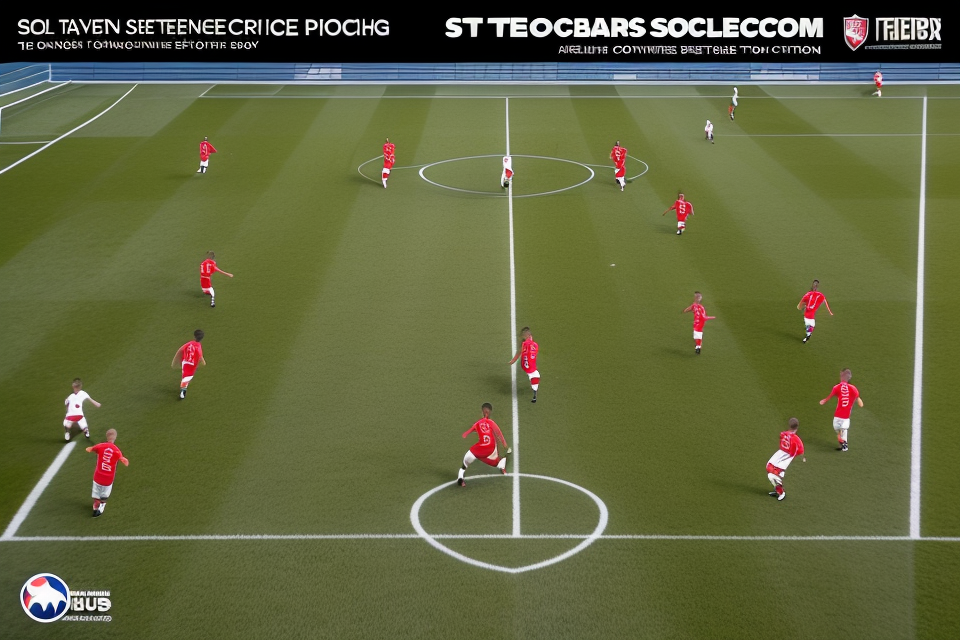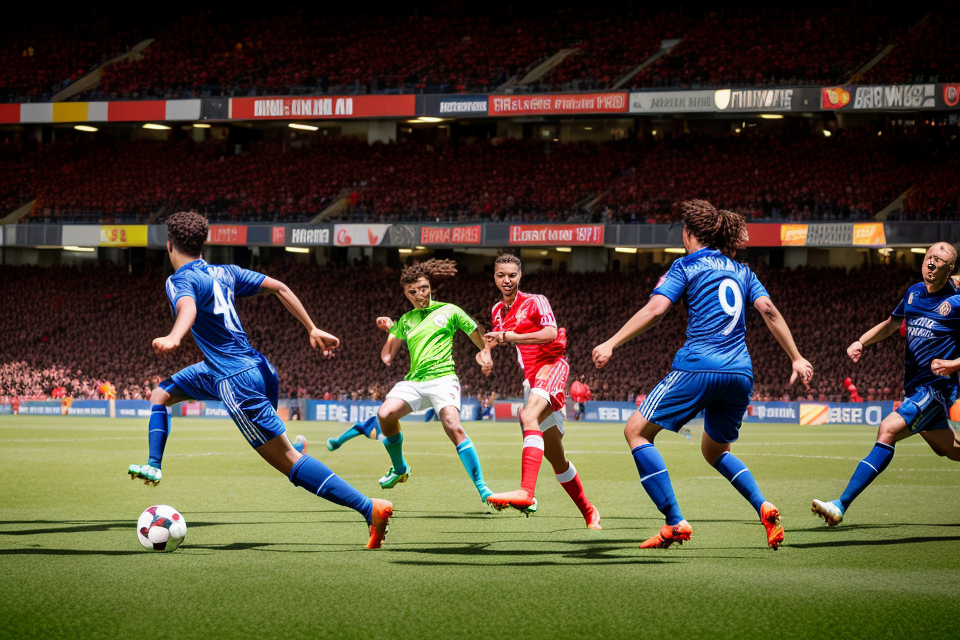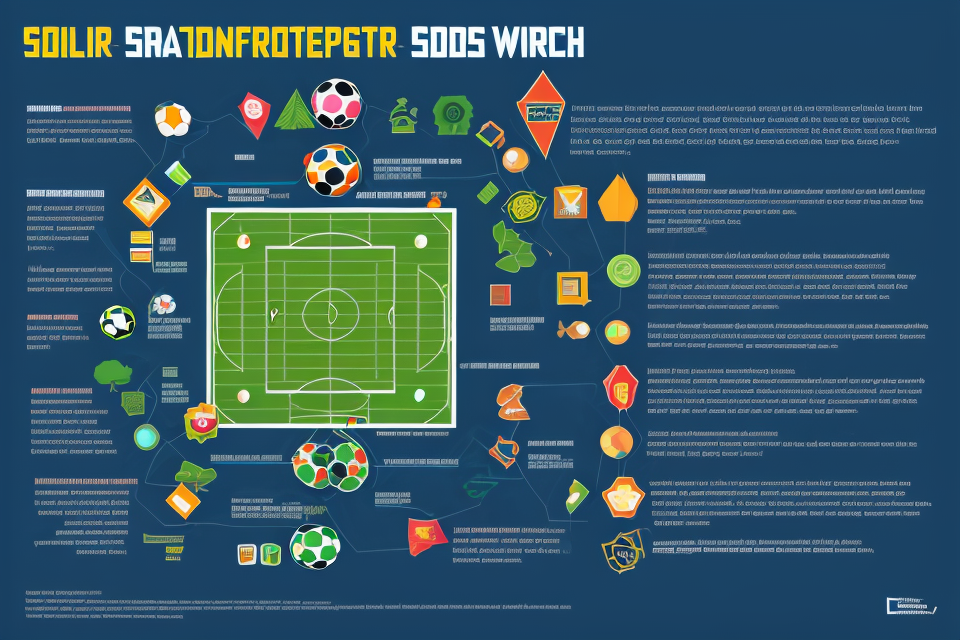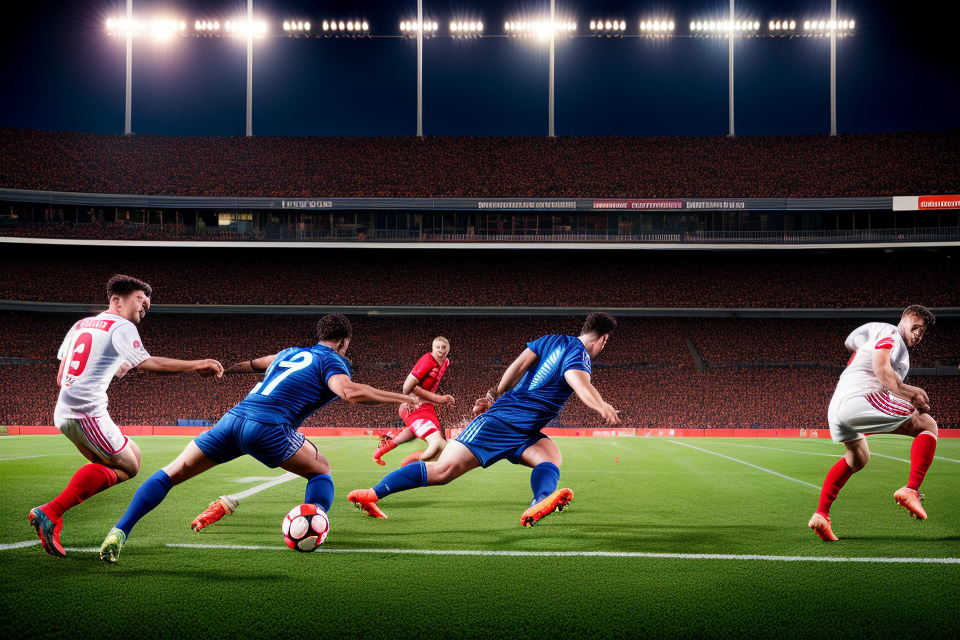Are you a soccer enthusiast looking to take your game to the next level? Or maybe you’re a parent seeking ways to help your child improve their soccer skills? Either way, you’ve come to the right place! Improving your soccer skills requires dedication, hard work, and a well-structured training program. In this article, we’ll explore some of the most effective ways to enhance your soccer abilities, from honing your technical skills to improving your physical fitness. So, let’s get started and discover the secrets to becoming a top-notch soccer player!
Improving your soccer skills requires a combination of practice, dedication, and a willingness to learn from your mistakes. Start by working on your basic skills such as dribbling, passing, and shooting. Focus on developing good technique and form, and don’t be afraid to experiment with different methods to find what works best for you. Additionally, try to get as much playing time as possible, whether it’s through practice with a team or playing pickup games with friends. Watching professional players and analyzing their techniques can also be helpful in improving your own skills. Lastly, remember that improvement is a gradual process, so be patient with yourself and stay committed to your goals.
Understanding the Basics
The Importance of Fundamentals
When it comes to improving your soccer skills, it’s important to remember that the basics are key. Fundamentals are the building blocks of any sport, and soccer is no exception. Mastering the basics of soccer will not only help you become a better player, but it will also give you a solid foundation to build upon as you continue to develop your skills.
Here are some reasons why the fundamentals are so important in soccer:
- Proper technique: The fundamentals of soccer include the basic techniques that are necessary for the sport. These include things like dribbling, passing, shooting, and tackling. By mastering these techniques, you will be able to execute them with precision and accuracy, which will help you be a more effective player on the field.
- Consistency: When you have a solid foundation of basic skills, you will be able to perform consistently, even under pressure. This is because you have a solid understanding of the fundamental movements and techniques required to play the game.
- Confidence: When you have mastered the basics of soccer, you will have more confidence in your abilities. This confidence will translate onto the field, and you will be more likely to take risks and make plays, which will help you become a more effective player.
- Prevention of injury: When you have proper technique, you are less likely to get injured. This is because you are using the correct muscles and movements, which will help prevent strain and injury.
In conclusion, the fundamentals of soccer are crucial to becoming a skilled player. By mastering the basics, you will have a solid foundation to build upon, and you will be able to perform consistently on the field. So, whether you are just starting out or you are a seasoned player, make sure to focus on mastering the fundamentals of soccer.
Warm-up and Stretching
The Importance of a Proper Warm-up
Before starting any physical activity, including soccer, it is crucial to warm up properly. A proper warm-up helps to prepare the body for the physical demands of the sport and reduces the risk of injury. Warming up should be a gradual process that raises the heart rate and prepares the muscles for exercise. A simple warm-up routine can include light jogging, dynamic stretching, and some light ball touches.
Types of Stretches for Soccer Players
Dynamic stretching is an excellent way to prepare the body for physical activity. It involves movements that mimic the movements of soccer, such as leg swings, hip circles, and leg kicks. These types of stretches help to increase flexibility, improve balance, and reduce the risk of injury. In addition to dynamic stretching, soccer players should also incorporate static stretches, such as hamstring and calf stretches, to improve flexibility and prevent injury. A proper warm-up and stretching routine should take between 15-20 minutes before the start of the game or practice.
Training Techniques
Individual Training
One of the most effective ways to improve your soccer skills is through individual training. This type of training involves working on specific aspects of the game that you need to improve on, without the distraction of other players.
Here are some examples of individual training exercises that can help you improve your soccer skills:
- Ball control drills: Ball control is an essential aspect of soccer, and there are many drills that you can do to improve your ball control skills. Some examples include dribbling around cones, ball control with your feet and chest, and ball control while running.
* **Speed and agility exercises:** Soccer is a fast-paced game that requires players to be quick and agile. There are many exercises that you can do to improve your speed and agility, such as sprinting, plyometrics, and agility drills. - Endurance training: Soccer matches can be physically demanding, and it’s important to have good endurance to last the entire game. Endurance training can include long-distance running, interval training, and other cardio exercises.
Overall, individual training is a great way to focus on specific aspects of the game and improve your soccer skills. It’s important to incorporate a variety of exercises into your training routine to ensure that you are improving all aspects of your game.
Team Training
Training with a team is a great way to improve your soccer skills as it allows you to practice working with other players, building teamwork and communication. Here are some team training techniques that can help you improve your soccer skills:
- Small-sided games for skill development: Small-sided games such as 3v3 or 4v4 can be used to focus on specific skills like dribbling, passing, and shooting. These games allow for more touches on the ball and encourage players to make quick decisions.
- Passing and receiving drills: Passing and receiving are essential skills in soccer, and team training can help you develop these skills. Drills can include short and long passes, crossing, and receiving the ball with different parts of the body.
- Defending and attacking drills: Team training can also help you improve your defending and attacking skills. Drills can include 1v1 defending and attacking, small-sided games focused on defense, and attacking movements off the ball.
- Set pieces: Set pieces such as corner kicks and free kicks are crucial in soccer, and team training can help you master these. Drills can include different types of set pieces, such as direct and indirect free kicks, and different ways to attack and defend them.
Remember, team training should be fun and engaging. Make sure to vary the drills and keep the players motivated to improve their soccer skills.
Goal Scoring Techniques
Improving your goal scoring techniques is an essential aspect of becoming a better soccer player. To achieve this, it is crucial to focus on the following:
- Finishing in the box: This involves mastering the ability to place the ball into the back of the net from close range. To improve your finishing skills, practice shooting at different angles and speeds, and try to focus on your non-dominant foot.
- One-on-one situations: These situations occur when you are one-on-one with the goalkeeper, and you need to find a way to get past them and score. To improve your one-on-one skills, practice dribbling around the goalkeeper and taking shots in a realistic game situation. Additionally, it is essential to develop good ball control and body positioning to beat the goalkeeper.
Nutrition and Recovery
Proper Nutrition for Soccer Players
A soccer player’s performance on the field is heavily influenced by their nutrition. Proper nutrition can help improve energy levels, boost immunity, and aid in muscle recovery. In this section, we will discuss the importance of nutrition for soccer players and provide tips on what to eat before and after training.
The role of nutrition in performance
Nutrition plays a crucial role in a soccer player’s performance on the field. A well-nourished body is better equipped to handle the physical demands of the game, including endurance, strength, and speed. Adequate nutrition also helps improve cognitive function, which is essential for making quick decisions on the field.
Foods to eat before and after training
Eating the right foods before and after training can help optimize performance and aid in recovery. Here are some tips on what to eat:
- Before training: Eat a balanced meal that includes carbohydrates, protein, and healthy fats. This will provide your body with the energy it needs to perform at its best. Good options include whole grain pasta, grilled chicken, and avocado.
- After training: Refuel your body with a snack or meal that includes carbohydrates and protein. This will help replenish energy stores and repair muscles. Good options include a banana and a handful of almonds, or a protein smoothie with fruit and spinach.
It’s also important to stay hydrated before, during, and after training. Aim to drink at least 8-10 glasses of water per day, and bring a water bottle with you to training sessions.
In addition to proper nutrition, it’s also important to prioritize recovery. This includes getting enough sleep, stretching, and allowing for proper rest and recovery time between training sessions. By taking care of your body on and off the field, you can improve your soccer skills and perform at your best.
Recovery Techniques
Recovery is a crucial aspect of improving soccer skills. Proper recovery techniques can help soccer players reduce muscle soreness, prevent injuries, and improve their overall performance on the field. Here are some effective recovery techniques that soccer players can incorporate into their routine:
Rest and recovery time for soccer players
Rest and recovery time is essential for soccer players to allow their bodies to repair and rebuild muscle tissue. It is recommended that soccer players have at least one rest day per week, where they refrain from any form of intense physical activity. During this rest day, players should focus on active recovery, such as light exercise or stretching, to help their bodies recover and prepare for the next training session.
Massage and foam rolling techniques
Massage and foam rolling are effective techniques for reducing muscle soreness and improving muscle recovery. Massage can help to release tension in the muscles, improve blood flow, and promote relaxation. Foam rolling, on the other hand, can help to break up muscle knots and improve mobility. Soccer players can incorporate massage and foam rolling into their routine after training sessions or games to help their bodies recover and prepare for the next day.
Mental Aspects of Soccer
Developing a Winning Mindset
Having a winning mindset is crucial to improving your soccer skills. A winning mindset involves being mentally tough and having the ability to focus on the task at hand, even in the face of adversity.
To develop a winning mindset, you can try the following techniques:
- Practice visualization: Visualization is a powerful tool that can help you to prepare for game situations and to build confidence. Take a few minutes each day to visualize yourself performing well on the soccer field.
- Set goals: Setting specific, measurable goals can help you to stay motivated and focused. Write down your goals and track your progress.
- Focus on the process, not the outcome: It’s easy to get caught up in the outcome of a game, but focusing on the process can help you to stay in the moment and to perform at your best. Focus on your actions and the steps you need to take to achieve your goals.
- Learn from mistakes: Mistakes are a natural part of the learning process. Instead of dwelling on your mistakes, use them as an opportunity to learn and improve.
- Stay positive: A positive attitude can go a long way in soccer. Stay positive, even in the face of setbacks, and use your energy to motivate yourself and your teammates.
By incorporating these techniques into your training, you can develop a winning mindset and improve your soccer skills.
Managing Pressure and Anxiety
In soccer, pressure and anxiety can significantly impact a player’s performance. The ability to manage these emotions is crucial for success on the field. Here are some strategies for handling high-pressure situations and mindfulness techniques for soccer players:
- Strategies for handling high-pressure situations
- Practice relaxation techniques: Deep breathing, progressive muscle relaxation, and visualization can help calm the mind and body during high-pressure situations.
- Focus on the present moment: Instead of worrying about the past or future, focus on the present moment and the task at hand.
- Maintain a positive attitude: Keep a positive mindset and believe in your abilities.
- Set realistic goals: Set achievable goals and break them down into smaller steps to avoid feeling overwhelmed.
- Take breaks: If you’re feeling overwhelmed, take a break and come back refreshed and ready to perform.
- Mindfulness techniques for soccer players
- Mindfulness meditation: This involves focusing on the present moment and observing your thoughts and feelings without judgment.
- Body awareness: Pay attention to your body and how it feels. This can help you become more aware of your movements and how your body reacts to different situations.
- Focus on the task at hand: Instead of worrying about the outcome, focus on the task at hand and what you need to do to succeed.
- Practice self-compassion: Be kind to yourself and avoid self-criticism. This can help you stay positive and motivated.
- Use positive self-talk: Speak to yourself in a positive and supportive way. This can help you build confidence and overcome anxiety.
By incorporating these strategies and techniques into your routine, you can improve your ability to manage pressure and anxiety on the field, leading to better performance and greater success in soccer.
FAQs
1. What are the essential skills to improve in soccer?
Answer: There are several essential skills to improve in soccer, including ball control, dribbling, passing, shooting, and defense. To become a well-rounded player, it is important to focus on developing all of these skills.
2. How can I improve my ball control in soccer?
Answer: Improving ball control in soccer requires practice and patience. One effective way to improve is to practice with a ball at your feet as much as possible. You can also try various exercises such as crossovers, ball rollings, and ball trapping to develop your ball control skills.
3. How can I improve my dribbling skills in soccer?
Answer: Dribbling is a crucial skill in soccer, and it can be improved with practice. To improve your dribbling skills, start by practicing with a small ball or cones. Focus on changing direction quickly and using both feet. You can also try dribbling around obstacles and performing turns and fakes to improve your ability to maneuver with the ball.
4. How can I improve my passing skills in soccer?
Answer: Passing is an essential part of soccer, and it can be improved with practice. To improve your passing skills, start by practicing with a partner or teammate. Focus on accurate and consistent passing, and try different types of passes such as short passes, long passes, and through-balls.
5. How can I improve my shooting skills in soccer?
Answer: Shooting is a crucial skill in soccer, and it can be improved with practice. To improve your shooting skills, start by practicing with a small ball or cone. Focus on accuracy and power, and try different types of shots such as volleys, half-volleys, and one-touch shots.
6. How can I improve my defense skills in soccer?
Answer: Defense is an important part of soccer, and it can be improved with practice. To improve your defense skills, start by practicing positioning and communication with your teammates. Focus on tackling, interception, and marking, and try different types of defensive formations to improve your ability to defend as a team.



